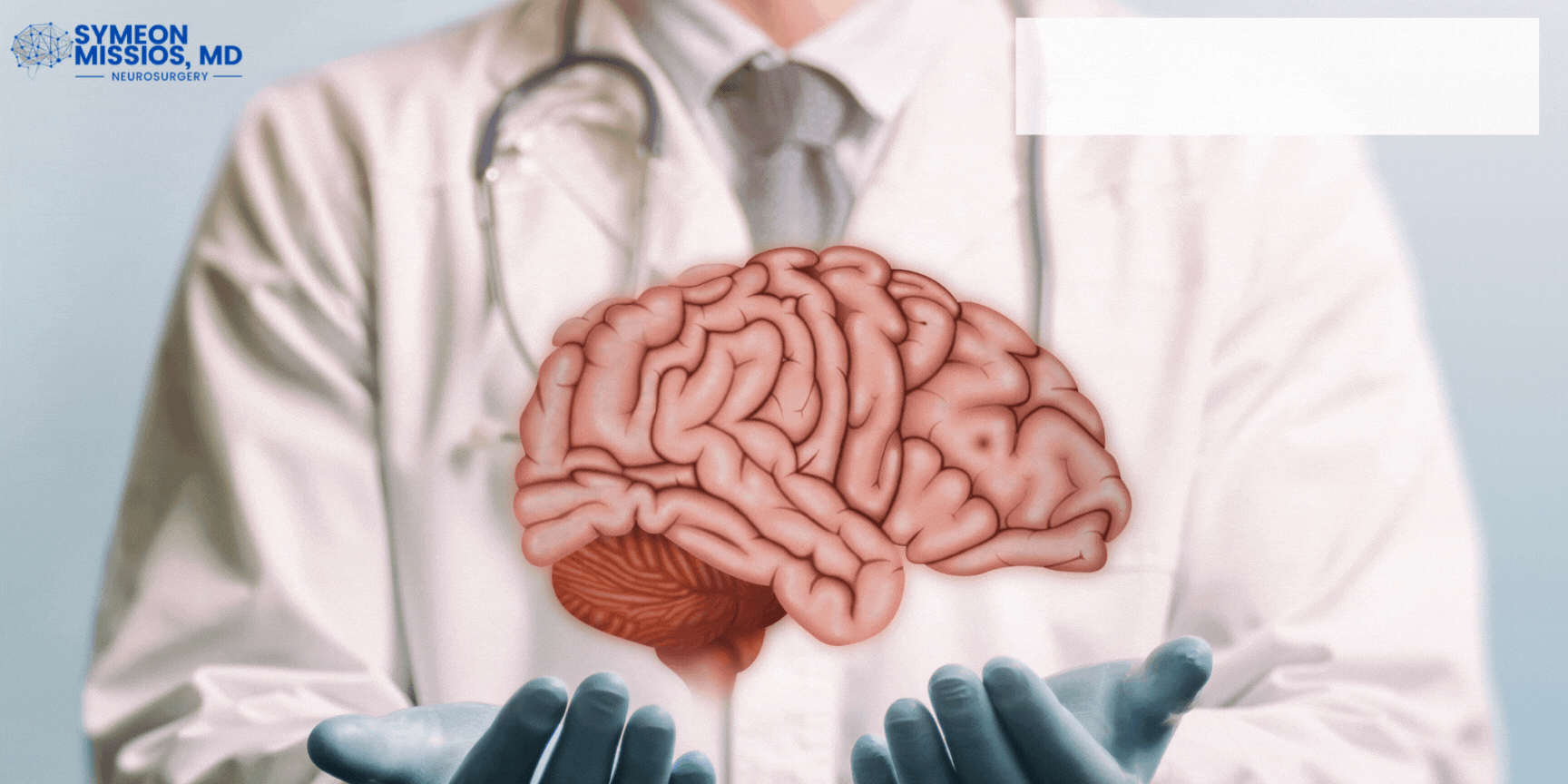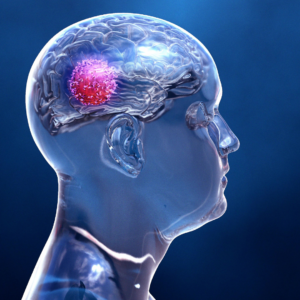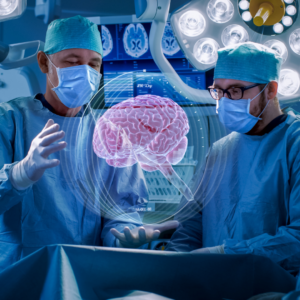Dr. Symeon Missios | Neurosurgeon Doctor In Smithtown NY

Primary brain tumors are a type of abnormal growth that originate in the brain and central nervous system. These tumors can develop in various parts of the brain, including the cerebral hemispheres, brainstem, and cerebellum, and they can be either benign (non-cancerous) or malignant (cancerous). Understanding what primary brain tumors are, their causes, symptoms, and treatments is crucial for anyone who is experiencing neurological symptoms. If you or a loved one are suffering from a primary brain tumor, contact Dr. Symeon Missios, MD, FAANS, neurosurgeon doctor in Smithtown, today!
Primary brain tumors are classified based on the type of cells that make up the tumor. The most common types of primary brain tumors include gliomas, meningiomas, pituitary tumors, and acoustic neuromas. Gliomas are the most common type of primary brain tumor and originate from the supportive tissue of the brain. Meningiomas are tumors that originate in the membranes that surround the brain and spinal cord, while pituitary tumors are tumors that develop in the pituitary gland, which is located at the base of the brain. Acoustic neuromas are tumors that develop in the nerve that connects the inner ear to the brain.
The exact cause of primary brain tumors is unknown, but some factors have been identified that may increase the risk of developing these tumors. These risk factors include exposure to radiation, family history of brain tumors, and certain genetic disorders. Additionally, some studies have suggested that exposure to certain chemicals, such as solvents and pesticides, may also increase the risk of developing primary brain tumors. The symptoms of primary brain tumors can vary depending on the size, location, and type of the tumor. Some of the most common symptoms include headaches, seizures, vision changes, loss of coordination and balance, and changes in personality or behavior. In some cases, primary brain tumors can also cause symptoms such as hearing loss, nausea and vomiting, and memory loss.
Diagnosing primary brain tumors with a neurosurgeon doctor in Smithtown usually involves a combination of medical tests and exams, including MRI, CT scans, and biopsies. A biopsy is a procedure that involves removing a small sample of the tumor for laboratory analysis, which can help determine the type of tumor and whether it is benign or malignant. Treatment for primary brain tumors depends on several factors, including the size, location, and type of the tumor, as well as the patient’s age, general health, and overall prognosis. The most common treatments for primary brain tumors include surgery, radiation therapy, and chemotherapy. In some cases, a combination of treatments may be necessary to achieve the best results.
Surgery is the most common treatment for primary brain tumors and is often the first line of treatment for many patients. Neurosurgeon doctor in Smithtown and other cities specialize in performing these complex procedures and are equipped with the latest technology and techniques to ensure the best possible outcomes. Radiation therapy is also a commonly used treatment for primary brain tumors, and it involves using high-energy radiation to destroy the cancer cells. Chemotherapy is another option for patients who are not candidates for surgery or radiation therapy, and it involves using drugs to destroy the cancer cells.
Neurosurgeon Doctor in Smithtown
In conclusion, primary brain tumors are a type of abnormal growth that originate in the brain and central nervous system. These tumors can cause a wide range of symptoms, including headaches, seizures, vision changes, and changes in personality or behavior, and they can be either benign or malignant. If you are experiencing any of these symptoms, it is important to seek the help of a neurosurgeon doctor in Smithtown or other cities who can provide you with a proper diagnosis and the right treatment to improve your quality of life. With their specialized training and expertise, neurosurgeons are equipped to handle a wide range of neurological conditions, and they can help you get the care you need to lead a healthy, active, and fulfilling life. Don’t wait until it’s too late to see a neurosurgeon. Early detection and treatment of primary brain tumors can greatly improve your chances of a successful outcome. So if you suspect that you or someone you know may have a primary brain tumor, don’t hesitate to seek the help of a neurosurgeon. Dr. Symeon Missios, MD, FAANS can provide you with the support, care, and guidance you need to navigate this challenging time and get the best possible treatment for your condition. Give us a call today!

Metastatic brain tumors, also known as secondary brain tumors, are a type of cancer that originate from cells that have spread to the brain from another part of the body. These tumors are different from primary brain tumors, which start in the brain itself. Metastatic brain tumors are much more common than primary brain tumors, and they can occur in people of all ages. Our neurosurgeon doctor in Smithtown can help you, so schedule an appointment with Dr. Symeon Missios, MD, FAAN.
The symptoms of metastatic brain tumors can vary depending on the size and location of the tumor. Some common symptoms include headache, nausea, vomiting, confusion, memory loss, and seizures. In more severe cases, patients may experience changes in their vision, hearing, or speech, and they may experience paralysis or loss of feeling in certain parts of their body. Diagnosis of metastatic brain tumors typically involves a combination of imaging tests and biopsy. A biopsy involves removing a small sample of the tumor for examination under a microscope. This helps Dr. Missios, neurosurgeon doctor in Smithtown, determine the type and stage of the cancer, and it helps them develop a treatment plan.
Treatment for metastatic brain tumors typically involves a combination of surgery, radiation therapy, and chemotherapy. Surgery may be recommended to remove as much of the tumor as possible, and radiation therapy can help shrink the tumor and relieve symptoms. Chemotherapy may also be used to kill cancer cells, and it may be given before or after surgery, or in combination with radiation therapy. It is important to remember that metastatic brain tumors can be difficult to treat, and the prognosis for each individual case will depend on a number of factors, including the size and location of the tumor, the type of cancer that has spread to the brain, and the patient’s overall health.
Local Neurosurgeon Doctor in Smithtown
If you or a loved one has been diagnosed with a metastatic brain tumor, it is important to seek the support and guidance of experienced healthcare professionals at neurosurgeon doctor in Smithtown; who can help you understand your options and develop a plan of care. You can get back to your everyday life with the right treatment and support. Contact Dr. Symeon Missios, MD, FAAN today!

When you hear about brain tumors, your immediate reaction is the immense treatment someone with a brain tumor has to experience. However, what should be mentioned is that not all brain tumors are the same. Meningioma brain tumors are one type that can be both benign and malignant. If you or someone you know has been diagnosed with a meningioma brain tumor, it’s crucial to seek guidance from Symeon Missios, MD, neurosurgeon doctor in Smithtown.
What Are Meningioma Brain Tumors?
Meningioma brain tumors can cause a range of effects on an individual’s health and well-being, depending on the tumor’s size and location. These tumors can put pressure on the brain and spinal cord, which can lead to various symptoms that can worsen over time. Some of the facts with those with meningiomas include:
Here are some key points to understand about meningioma brain tumors:
- They are more common in women than they are in men.
- Most people who have meningioma brain tumors have no symptoms.
- Treatment options depend on the size, location, level of the tumor, and the patient’s age and overall health.
- Surgery is the primary treatment for meningioma brain tumors, but another option is radiation therapy.
- In some cases, additional observation may have to happen for small, asymptomatic tumors.
If you or a loved one is experiencing these symptoms, seek medical attention from a qualified neurosurgeon doctor in Smithtown.
The Effects of Meningioma Brain Tumors
Meningioma brain tumors can have various effects on the body, depending on their size and location within the brain. Some of the effects with those that have meningiomas include:
- Headaches: Headaches are a common symptom of meningiomas and may be severe and persistent.
- Vision problems: Meningiomas near the optic nerve or the area of the brain that controls vision can cause vision problems or even vision loss.
- Seizures: Seizures may occur in those with meningiomas, especially if the tumors grow in areas of the brain that control movement or sensation.
- Cognitive changes: Meningiomas can cause mental changes such as difficulty with memory, concentration, and problem-solving.
- Weakness or numbness: If a meningioma is near the nerves that control movement or sensation, weakness or numbness in certain body areas may occur.
- Personality changes: In rare cases, meningiomas can cause changes in personality or behavior.
If you believe you have a meningioma, it’s essential to seek the expertise of a neurosurgeon doctor in Smithtown so they can assess your condition and develop a personalized treatment plan for you.
Contact Symeon Missios, MD: Neurosurgeon Doctor in Smithtown
In conclusion, Meningioma Brain Tumors can cause various symptoms that impact the body, depending on their size and location within the brain. It is essential to seek medical attention from a qualified neurosurgeon doctor in Smithtown, such as Symeon Missios, MD, who offers personalized treatment plans and uses the latest technology to provide patients with the best possible care. Don’t hesitate to contact Symeon Missios, MD, if you have any concerns or questions about meningioma brain tumors.

Brain tumors are a serious health concern and can cause significant damage to the brain and nervous system. Despite extensive research, the exact cause of brain tumors is not yet fully understood. However, there are several risk factors that have been identified. To learn more, contact Dr. Symeon Missios, MD, FAANS, neurosurgeon doctor in Smithtown.
Risk Factors:
A significant risk factor for brain tumors is exposure to radiation. This includes exposure to ionizing radiation, such as from medical imaging tests like CT scans, as well as exposure to non-ionizing radiation, such as from cell phone use. Recent studies show that people who have received radiation treatment to the head are at a higher risk of developing brain tumors.
Another risk factor for brain tumors is a genetic predisposition. Some rare genetic conditions, such as neurofibromatosis type 1 and type 2, are known to increase the risk of developing brain tumors. In addition, a family history of brain tumors may also increase an individual’s risk.
Environmental factors may also play a role in the development of brain tumors. Exposure to certain chemicals, such as pesticides and solvents, has been linked to an increased risk of brain tumors. However, the evidence linking environmental factors to brain tumors is not yet conclusive. Talk to your neurosurgeon doctor in Smithtown to find out more! Please note that not all brain tumors are cancerous, and not all brain cancers are caused by the same factors. Some brain tumors are benign, meaning they are not cancerous and will not spread to other parts of the body. Malignant brain tumors, on the other hand, are cancerous and commonly spread to other parts of the body. The main cause of brain tumors is not fully understood, but there are several risk factors that have been identified, including exposure to radiation, genetic predisposition, and environmental factors. It is important to take precautions to reduce your risk of developing brain tumors, such as limiting exposure to radiation and taking steps to reduce exposure to environmental toxins. If you are worried about your risk of developing a brain tumor, it is important to discuss these with your neurosurgeon doctor in Smithtown.
Top Neurosurgeon Doctor in Smithtown
If you are looking for a neurosurgeon doctor in Smithtown, contact Dr. Symeon Missios, MD, FAANS. Our team can help you get the proper treatment you need.

The brain is one of the most important organs in the human body. It is also one of the most complex organs, with a staggering complexity of 100 billion neurons, each of which can have up to 10,000 connections. It is a very fragile organ, as a ruptured blood vessel in the brain can be fatal. Brain tumors are common, with one in every million people being diagnosed with one every year. Brain tumors can be devastating, but you can reduce your risk by following these simple steps and working with a neurosurgeon doctor in Smithtown, Dr. Symeon Missios, MD, FAANS.
Why Do People Get Brain Tumors?
There are several different types of brain tumors. The most common types of brain tumors are meningiomas and glioblastomas. They are most commonly found in the centers of the brain, the cerebrum, and the cerebellum. The biggest risk factors for developing a brain tumor are age and exposure to radiation and chemicals. There are also many risk factors that are not obvious, such as genetics.
How To Reduce Your Risk Of Brain Tumors
Many people have thought of methods to reduce their risk of brain tumors, but if you have already been diagnosed with one, contact a neurosurgeon doctor in Smithtown. One of the best ways to help reduce your risk of brain tumors is to avoid using cell phones. Cell phones emit a lot of radiation, and it has been found that the radiation can cause brain tumors. This is why people should use a landline instead of a cell phone. Another method of reducing your risk of brain tumors is to avoid using your microwave. This method is very easy to do. Just use your oven for cooking your food instead of using your microwave. Another method of reducing your risk of brain tumors is to avoid using your microwave. This method is very easy to do. Just use your oven for cooking your food instead of using your microwave.
How To Prevent Brain Tumors
One of the best ways to prevent brain tumors is to not smoke. Smoking is a leading cause of brain tumors, and not only that, but it also causes many other health problems. If you quit smoking, it will lower your risk of developing a brain tumor. However, quitting smoking is not an easy task. It will take time and effort, but it is worth it in the end. Smoking is not something you should take lightly, and it is not something you should just do for fun. It is a serious health issue, and it should not be taken lightly.
Contact Us: Neurosurgeon Doctor in Smithtown
When it comes to brain tumors, there are many things one can do to reduce your risk. These include reducing your exposure to radiation, maintaining a healthy diet, and exercising regularly. If you follow these measures, you will be able to reduce your risk of a brain tumor. If you are diagnosed with a brain tumor, speak with a neurosurgeon doctor in Smithtown,Dr. Symeon Missios, MD, FAANS, about the different treatment options.
